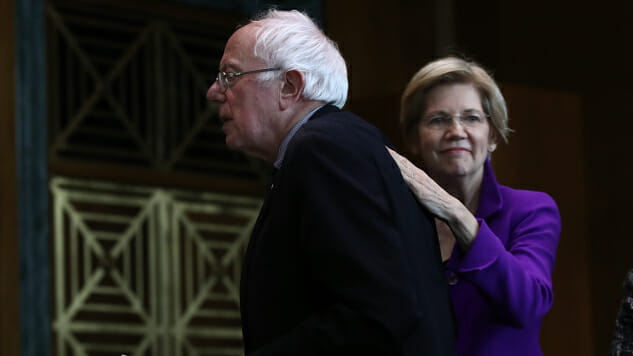Bernie Sanders and Elizabeth Warren Both Stand to Benefit From Announcing First. Who Will Take the Leap?
Photos courtesy of Getty
I know, I know: The existence of this article disgusts you. We’re just hours free of the midterms, with many races still pending, and here I am writing about the 2020 primaries. But I can’t stop thinking about a conundrum facing Bernie Sanders and Elizabeth Warren as they contemplate the 2020 presidential election, and I guarantee they’re thinking about it too.
Before I get there, let’s take two things as given:
1. Both of them want to run for president. I think this is clear based on recent activity—Bernie has been traveling the country, Warren has been attempting to defend her reputation, and both have made it all but clear that they’re running. I’m not saying it’s definite—strange things can happen—but for now let’s accept that they at least want to run, and are intending to run.
2. They both stand a much better chance to secure the nomination if the other isn’t running. The Atlantic laid out the case pretty effectively, and it’s not complicated: They represent the progressive wing of the Democratic party, and if only one of them runs against a crowded field of more moderate contenders—say, Biden, Harris, Booker, and Gillibrand—that person stands a good chance to divide and conquer his or her way to the nomination while the centrists split the establishment vote between them. If both run, it’s likely they’ll siphon votes off from each other and make everything more difficult.
Which brings us to the conundrum: The American appetite for another long, brutal primary is exceedingly low, especially in the wake of the midterms, and there’s a price to be paid for announcing a presidential run too soon. However, there’s an even bigger price to be paid for announcing second, especially when it comes to these two.
Let’s look at it from both perspectives.
If you’re Bernie, you probably feel like, to some extent, you are both the better choice and the more deserving choice. Not only did he bite the bullet and run against the invincible Hillary Clinton while Warren stayed on the sidelines, but he came shockingly close to an upset win, and built himself a national profile in the process. Warren wouldn’t endorse him in the Massachusetts primary, and suffered for it at the time. Today, Bernie is always one of the most popular politicians in America in any given poll, and his reputation is mostly serene. He must feel like the progressive flag of the Democratic party should be his to carry—especially after Warren bungled her heritage situation—and further, he must see the benefit in announcing first. If he gets there before Warren, he can say the following: We have similar beliefs, the country knows me better, I’m more popular, and I can rebuild my infrastructure faster than you can build yours from scratch. So why would you enter, Sen. Warren, other than to play spoiler?
It would leave Warren without much an argument, especially because the two are friendly with—and admire—one another.
If, on the other hand, Warren jumped in first, she could claim plausible deniability about Bernie’s intentions to run, and benefit from the momentum of being there before him. She could claim to be a less divisive figure—someone who could unite the Hillary feminists with the Bernie Bro progressives. If Bernie entered second, there would be an inevitable backlash among certain liberal women who believe the time has come for a female president, and who still feel cheated from 2016…and who may blame Bernie, in part, for that loss. Warren wouldn’t even have to say much—the narrative would play out on its own. Bernie would still enter the race, in all likelihood, but he would enter on the back foot.
In essence, both would be asked to explain why they’re better if they come in late, and that’s an awkward place to be. It seems like Sanders could practically end Warren’s candidacy by going first, while Warren could at the very least make things uncomfortable for him. At that point, it becomes like an exercise in game theory—it would be unseemly to announce immediately after the midterms, but the longer each one ones wait, the more time their give their opponent to seize the initiative.
We don’t know when the first announcement will happen, but when you look at the benefits on each side, it becomes clear that one will take the leap very soon. Fortune favors the bold.







































